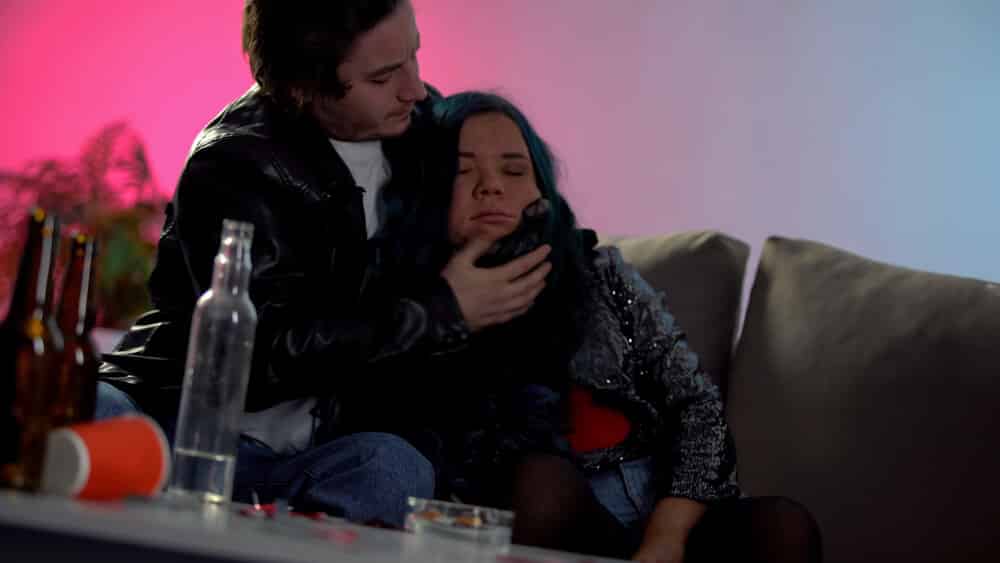Alcohol poisoning isn’t just the effect in the bloodstream, it is also about what comes after during the recovery process. Statistically, over 2,200 people a year die from alcohol poisoning. That is six people per day. People in our workplaces, in our communities, and in our families.
Many slip into it accidentally by being unaware of their alcohol tolerance or from alcohol peer pressure. In a culture where it is normal to binge drink or have a wild night out, it can be difficult to find tips to help you get sober when alcohol poisoning is seemingly a right of passage.
How Does Alcohol Poisoning Happen?
Alcohol poisoning happens when too much alcohol enters the bloodstream and begins to take control of your brain. Consequently, it affects how your brain can communicate with your heart, lungs, and body temperature.
As your body recognizes an overload in the system, there are several symptoms that can occur. Mayo Clinic describes these symptoms as,
- Slow Breathing (less than eight breaths a minute)
- Irregular Breathing (a gap of more than 10 seconds between breaths)
- Confusion
- Difficulty remaining conscious
- Vomiting
- Seizures
- Blue-tinged or pale skin
- Low body temperature
- Unconsciousness and cannot be woken up

Alcohol poisoning varies for different people based on age, gender, pre-existing conditions, height, weight, as well as tolerance levels. What may be too much for one person, may feel like a regular amount for another. The key is understanding your own relationship to alcohol use and whether alcohol rehab can aid your recovery in the road forward towards a healthier life.
What Are The Effects of Alcohol Poisoning?
The effects of alcohol poisoning vary for individuals, but there are common symptoms that gradually reveal themselves as the alcohol begins to take over bodily systems and brain functionality. Symptoms may appear as,
- Slow Brain Function
- Loss of Muscle Control and Coordination
- Lack of Nerve Control
- Irritation of stomach function: causing loose bowels or lack of bladder control
- Lower blood sugar levels: potentially leading to uncontrollable seizures
- Low body temperature: leading the inability to maintain a steady regular temperature and causing hypothermia
- Dehydration: potentially leading to permanent brain damage
If alcohol poisoning is not treated, it can potentially lead to extreme dehydration, choking on vomit, or even death.
However, alcohol poisoning is treatable through access to immediate medical attention. The faster someone is able to receive medical attention, the greater chance the body has of recovering and avoiding long term brain damage or severe adverse effects. The road in recovery can involve the support on how to live a sober life to avoid a future episode.
What To Do When Someone Is Experiencing Alcohol Poisoning
If someone is experiencing alcohol poisoning, call emergency services immediately. Even if they are showing signs early, not all of the alcohol in their system may be processed yet, which can lead to worsening symptoms.

A few precautions you can take to help them is to,
-
- Keep them awake (if possible): Talk them through what is happening. If you have to maneuver them to sit-up, talk to them about what you’re doing and how you’re here to help. If the person becomes aggressive, take the steps you need to keep you and them safe.
- If they are able to swallow, help them slowly sip water.
- If the person is lying down and you’re unable to maneuver them to a sitting position, position them on their side with their arms over their head to keep them from choking on their own vomit.
- Keep them warm with a blanket or extra jacket, as alcohol affects their body temperature.
- Stay alert and calm. By being calm, you can de-escalate the situation from getting out of hand, aggressive, or potentially dangerous. Once medical personnel arrive, then you can share what you know about the situation, what happened prior, whether any drugs were involved, and what you’re aware of for the person’s history in a clear manner.
Once At the Hospital, How Is Alcohol Poisoning Treated?
At the hospital, a patient is initially monitored if they can recover on their own. In many cases, alcohol in the body’s system will have to be expelled to remove the alcohol faster. Often an IV drip is put in place to rehydrate the body, while a catheter aids the drainage of urine quickly. In some instances, a tube will be put in place to remove blockages or assist with breathing. If they have been admitted multiple times, they may be referenced to an alcohol rehab facility.
What Comes After?
After an episode of alcohol poisoning, it isn’t just about the body slowly recovering. While many recover from this alcohol abuse, it is estimated that 30% of alcohol poisoning related deaths are related to alcoholism.

The key is to make sure that the person does not feel alone after an episode with alcohol poisoning. When the effects settle in after, it can be much harder for someone to recover if they feel they don’t have a good support network to lean on. Finding mental health support from a professional, your family, or friends helps aid the process in recovery.
If a friend has had previous issues with alcohol and has gone through an episode of alcohol poisoning, offer support where they may need it. Whether it is talking about it, or looking for resources that support a sober lifestyle.
Who Is At A Higher Risk For Alcohol Poisoning?
Risk factors can include a number of things. Family history can make an initial difference, as well as if the person had any previous health complications. Height and weight can play a role in tolerance levels, but also the number of drinks consumed in one evening. If a person is smaller in stature, chances are they won’t be able to keep up with the amount of drinks a taller or bigger person consumes.
What can put someone at higher risk for alcohol poisoning also can include what they ate before or during the consumption of alcohol, the percentage of alcohol within those drinks, and the number of drinks consumed.
While typically early teens are peer-pressured into drinking and are tempted away from a sober life, that same behavior has the ability to last through a person’s college years and well into middle-age.
Socially, it is nearly acceptable to binge drink and consume a large amount of alcohol at parties and gatherings. Particularly during a person’s college years, this can become an accepted pattern of behavior. At times, even expected in social settings that continues a negative spiral of alcohol abuse lasting well into adulthood.
While some stop binge drinking after college, statistically it affects older men who continue the habit, or relapse from stress. Knowing how alcohol has affected your own family, or what drives you to drink can help you recognize the behavior and decide for yourself how to quit drinking to avoid being at a higher risk for alcohol poisoning.
Social Pressure Leading to Alcohol Poisoning
If you’ve been to a bar, you may have heard the standard drink rule. The National Institute of Alcohol Abuse and Alcoholism refers to a standard drink as,
- 1 12 fluid ounce of beer (5% alcohol)
- 8-9 fluid ounce of malt liquor (7% alcohol)
- 5 fluid ounce of wine (12% alcohol)
- 1.5 fluid ounce shot of distilled spirits (40% alcohol)

In the United States, alcohol is illegal until the age of 21, but that doesn’t stop groups of underage teenagers from participating. The appeal of freedom and rebellion often can take over the idea of sobriety. This is often where the behavior of consuming too much alcohol begins, but there are ways you can shift your relationship to alcohol no matter what age you are through a recovery app or support from those around you.
How To Manage Social Pressure
Managing social pressure can take time to develop healthy coping mechanisms, as well as developing healthy and supportive friendships around you that support a sober lifestyle.
Here are a few ways you can manage social pressures to avoid alcohol poisoning in the future,
- Practice responding to the pressure of drinking. Having a response ready or a way to exit the situation can ease the stress at the moment. Try practicing a conversation with a friend or family member.
- Ask for juice or soda instead. Many people feel a little awkward when not holding a drink in their hand at a gathering or party. Instead of an alcoholic one, you can hold juice instead.
- Exit the situation. Call a friend or family member and ask if they can come to pick you up. If you’re feeling uncomfortable, you always have the option to leave and find a safer and sober environment.
- Understand the risks involved when consuming too much alcohol. While many have experimented and learned first-hand, it helps to understand and identify the risks of alcohol consumption. By being aware of your own history, you can be more conscious of your own actions, as well as can help those around you to live a sober lifestyle.
Remember, you always have a choice. While in the moment it may not feel like it, you have the choice to keep yourself, and your friends, safe from having to take a trip to the hospital. By being an advocate for your own needs and being aware of your environment, you can consciously choose how to quit drinking.
Prevention and Living a Sober Lifestyle
Chances are, if you’ve experienced alcohol poisoning before or have gone through it multiple times, it is not something you intentionally want to repeat. It takes a toll on your body physically and ultimately affects your mental awareness of your own limitations. There are many tips to help you get sober, as well as ways to moderate yourself while out with friends.
The effects of alcohol poisoning can be prevented through simple actions,
Drink In Moderation
If you do decide to drink, drink in moderation, or encourage your friends to take it easy around you. Knowing how much you have consumed and whether you ate food while drinking can prevent an episode of alcohol poisoning.
Choose a Sober Evening
Choose to linger near the snacks instead and decide to be sober for the evening. If you’re worried about relapsing, ask a friend to stay sober with you.
Communicate Your Concerns
Communicate with your friends or family about your choice in living a sober lifestyle. Naturally, it can be challenging to communicate that you may be having a hard time with alcohol, and may even have been diagnosed with alcohol use disorder in the past.
If you are in recovery, talk to your friends about it. Communicate how you are feeling about going into a social situation and how you want to avoid drinking for the evening, or are looking for someone to keep you accountable.
Finding a Supportive Community
If you are looking for support, get in touch through our recovery app Loosid. Our app provides the ability to connect with like-minded people who are walking the same journey you are towards a sober life. If you have recently had an episode of alcohol poisoning, there are resources to walk you through the steps in recovery.
Alcohol poisoning is preventable. By choosing to be consciously aware of your own patterns of behavior, you can enter social situations without taking on the stress of peer pressure and can be an encouraging support to those around you who are in recovery too.


